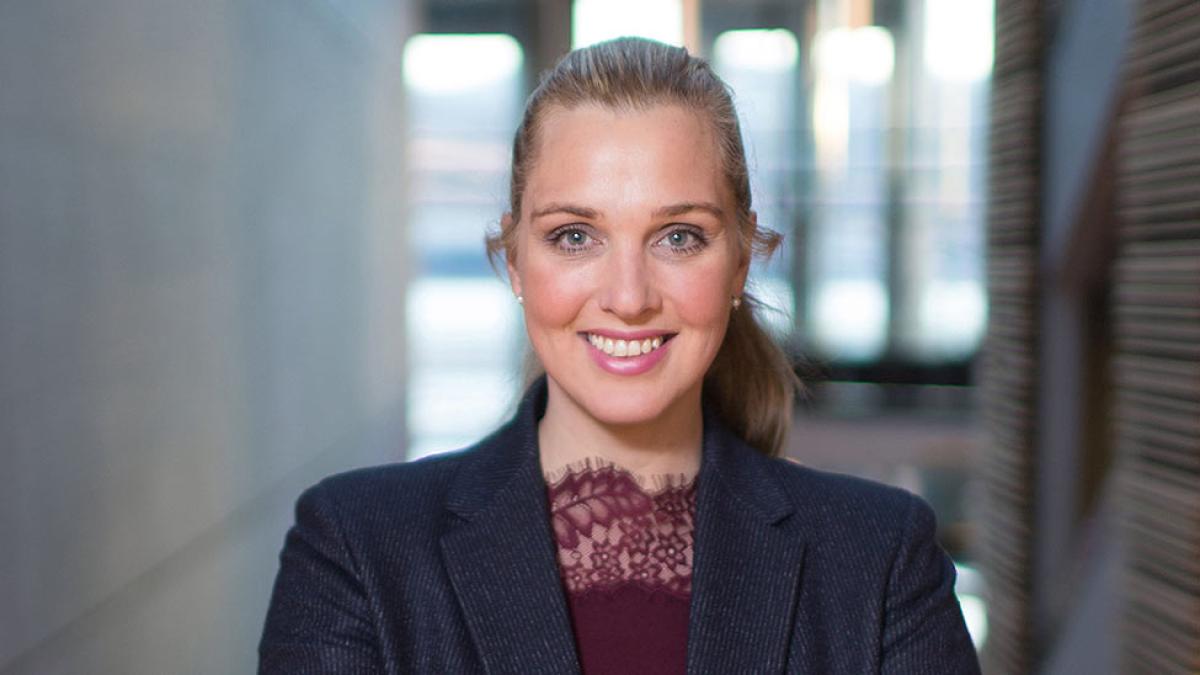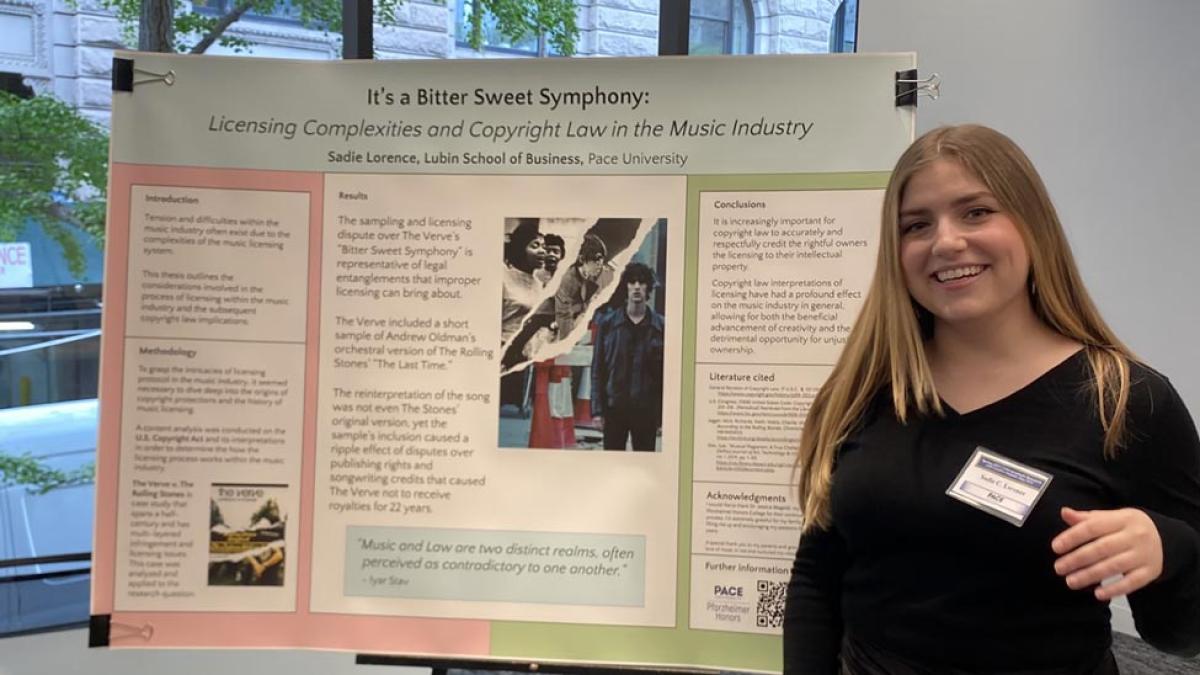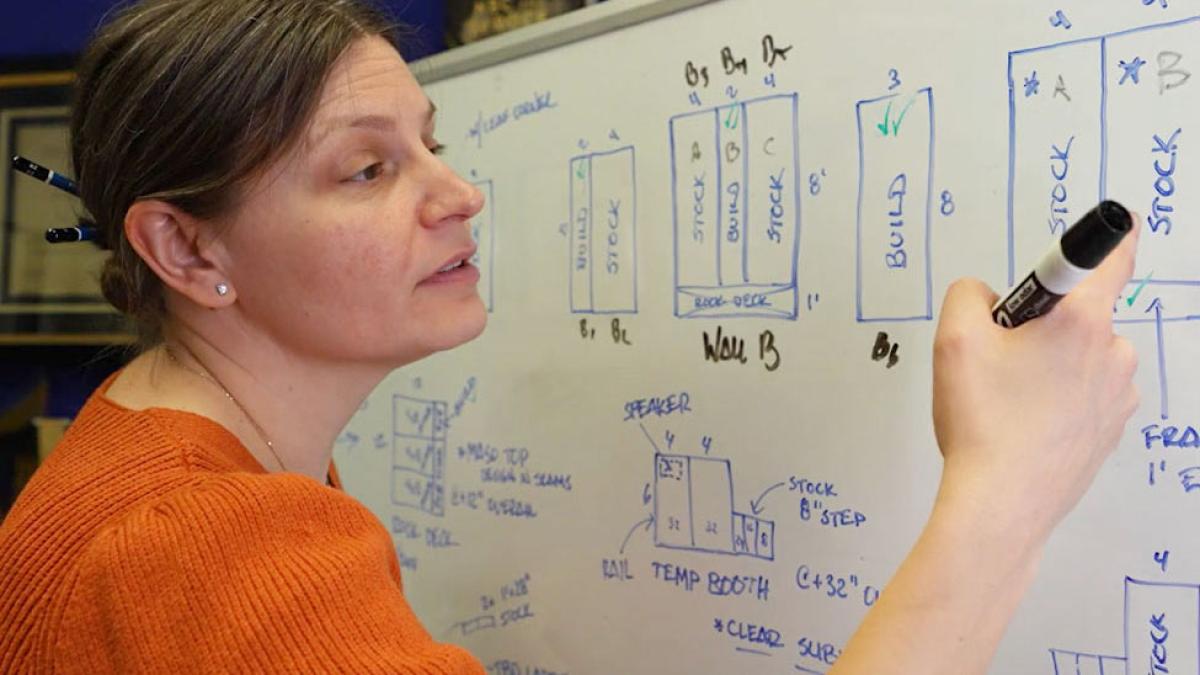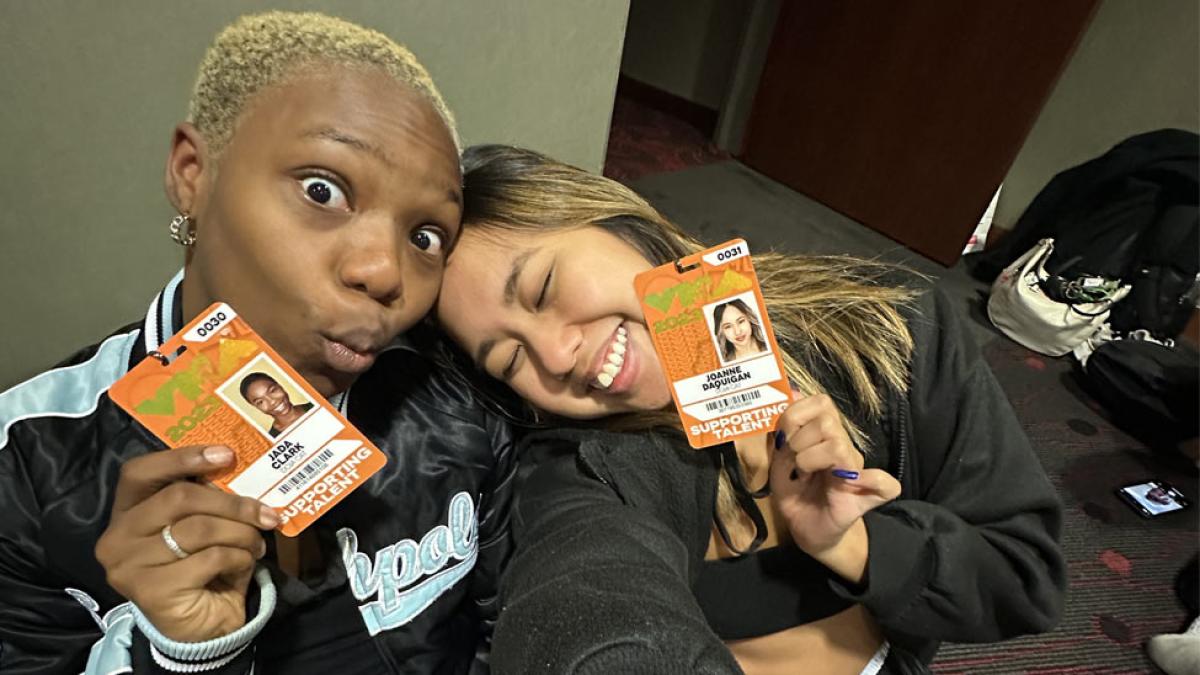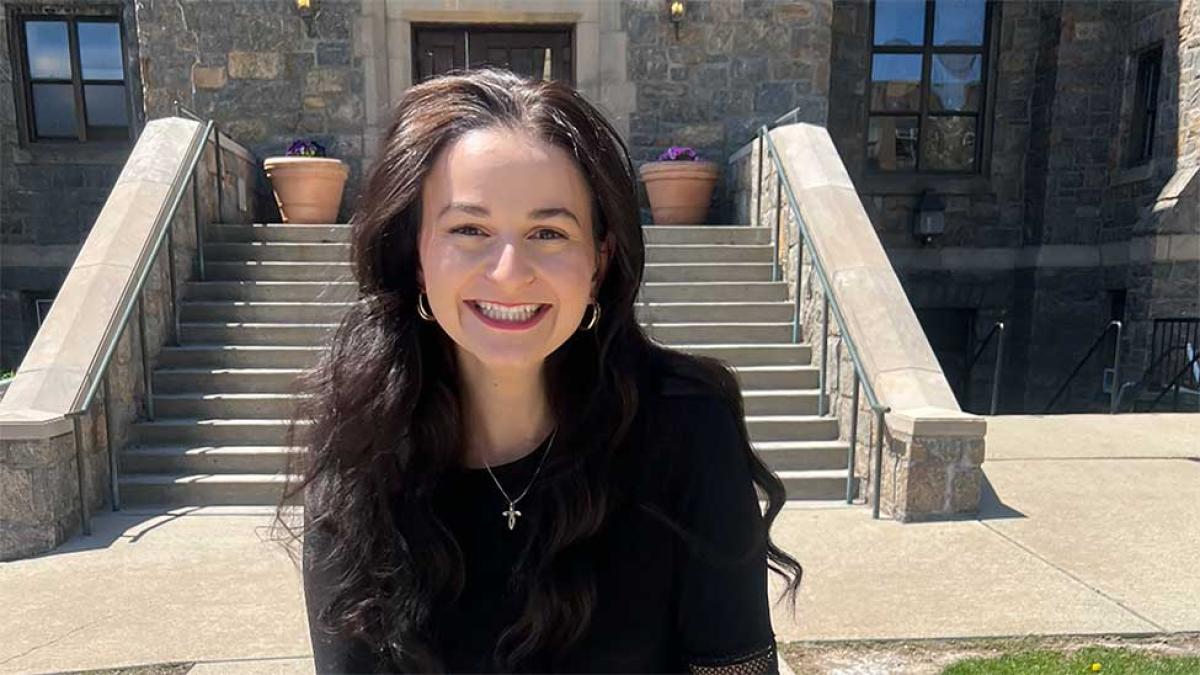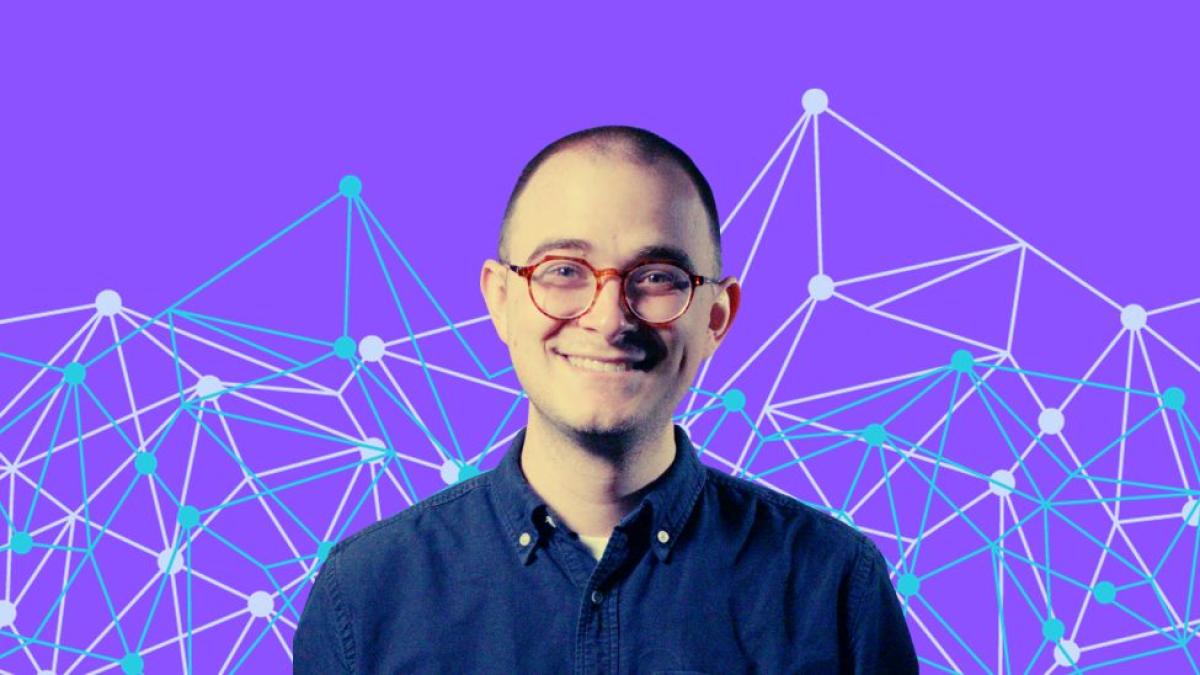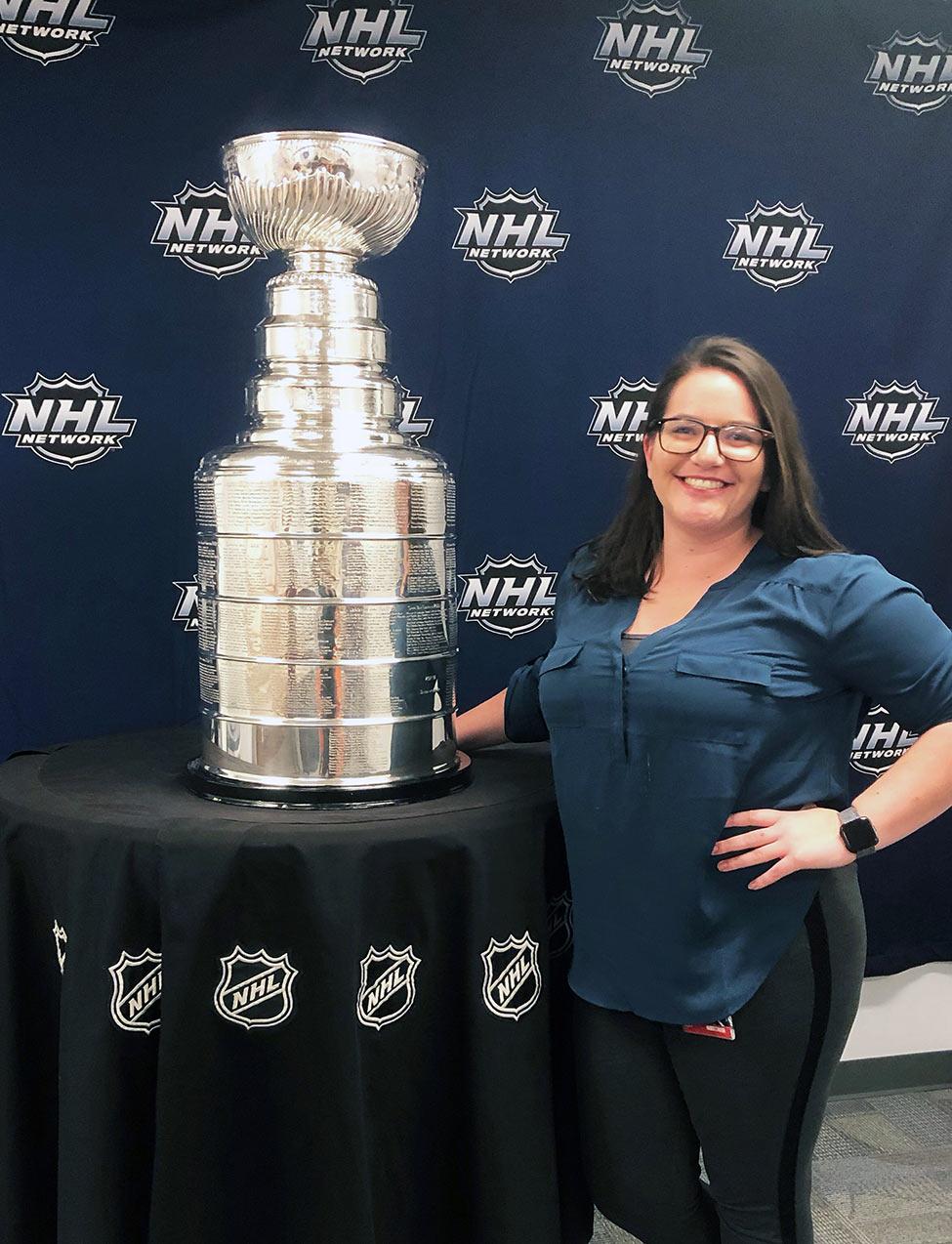
Thought Leader Chris Rabb Delivers Impactful 2023 Dyson Distinguished Lecture
On Wednesday, October 25, 2023, Chris Rabb delivered the 2023 Dyson Distinguished Lecture at the Elisabeth Haub School of Law at Pace University. Chris Rabb is a family historian, author, and thought leader at the intersection of social identity, civic innovation, and equity. His lecture was entitled: “Navigating Identity, Purpose and Belonging in a Society in Flux.”

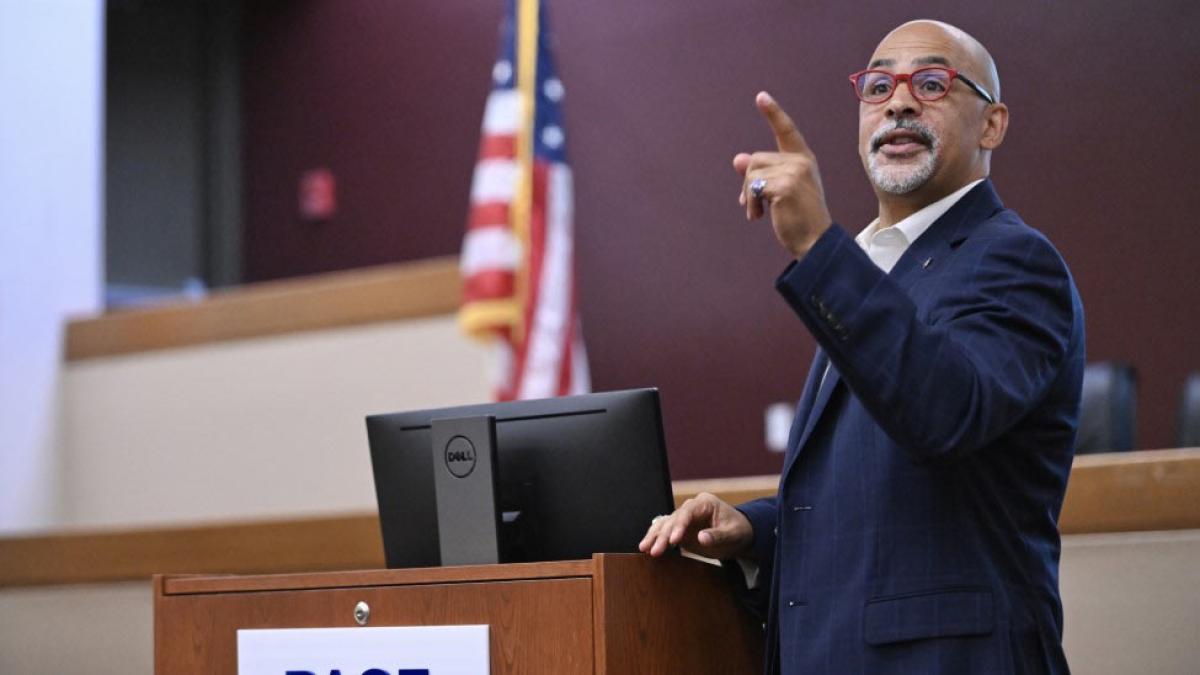
On Wednesday, October 25, 2023, Chris Rabb delivered the 2023 Dyson Distinguished Lecture at the Elisabeth Haub School of Law at Pace University. Chris Rabb is a family historian, author, and thought leader at the intersection of social identity, civic innovation, and equity. His lecture was entitled: “Navigating Identity, Purpose and Belonging in a Society in Flux.”
Haub Law Dean Horace Anderson spoke about the history of the Distinguished Dyson Lecture and thanked Mr. Rabb for delivering this year’s lecture. University Distinguished Professor of Law, Bridget Crawford, followed with a formal introduction of Mr. Rabb, speaking about his background and impressive accomplishments. Professor Crawford attended Yale College at the same time as Mr. Rabb and noted his role in the ultimate renaming of one of Yale’s residential colleges. She described Mr. Rabb as an incredibly hard worker who has dedicated his life to ending institutional, interpersonal, and all other forms of injustice.
Mr. Rabb began his engaging lecture discussing the important difference between “fitting in” and “belonging.” He noted that the two are not synonymous, as “belonging is about connectedness, being accepted for exactly who you are.” Mr. Rabb described his personal journey as a genealogist, which he began over thirty years ago in order, as he describes it, to find out “who his people were.” He discussed at length his lineage and family connections to both enslaved people and their enslavers. This has given him a complex perspective on the intersection of identity, purpose, and civic engagement. He noted that each of us has a social identity that influences our connectedness, community building, and placemaking, especially in divisive times.
As Mr. Rabb continued his lecture, he touched on the important difference between ancestry and heritage and how this played into his own personal journey of discovering his own social identity. “Ancestry is what you are: your pedigree, your parents, grandparents,” he noted. “Genetically that is what makes you up. Heritage is very different. Heritage is about who you choose to become. You have choice over that.” Mr. Rabb has been an outspoken critic of the Supreme Court’s decision in Students for Fair Admission v. Harvard. During his lecture, he discussed the connection between and among opportunity, privilege and social identity, along with the future of affirmative action in higher education.
He rounded out his riveting and personal lecture by discussing the roles to which all are called. “We all have gifts. What do we do with them? That is your exploration,” he encouraged students. Mr. Rabb acknowledged that the role that one may find oneself in at any given moment may require embracing an “inconvenient truth;” it may be an unanticipated role, but each of us must rise to the occasion. “If you can find the community of conscience that you can participate in that role with, it will give you so much wealth. That is the real wealth that matters,” said Mr. Rabb. “Community wealth. The wealth that transcends finances and social status, wealth that brings you joy that gives you a sense of purpose. I implore you to step up.”
Following the lecture, Mr. Rabb was presented with the Dyson Medal by Dean Anderson and Professor Crawford. He then participated in an insightful Q&A session with the audience. In response to a question regarding belonging, Mr. Rabb encouraged the audience to look inward for a sense of belonging. “Wherever you show up, that is where you are supposed to be. I am not going to let anyone tell me that I don’t belong somewhere,” said Mr. Rabb. “You know your own value. When you know your own self-worth, it is really hard to be intimidated.” The conversations continued at a post-lecture reception held at Haub Law.
Chris Rabb is a proud father, author, and public speaker. While a visiting researcher at Princeton University, he wrote the book, Invisible Capital: How Unseen Forces Shape Entrepreneurial Opportunity (2010). He also taught at Temple University's Richard J. Fox School of Business and Management where he was the Social Impact Fellow at the Innovation and Entrepreneurship Institute and taught social entrepreneurship and organizational innovation. He has appeared as a guest with several local and national media outlets, including: The New York Times, The Huffington Post, MSNBC, NPR, Philadelphia Daily News, Philadelphia Inquirer and the Associated Press. Mr. Rabb is a graduate of Yale College and the University of Pennsylvania.
The Dyson Distinguished Lecture was endowed in 1982 by a gift from the Dyson Foundation and made possible through the generosity of the late Charles H. Dyson, a 1930 graduate, trustee, and long-time benefactor of Pace University. The principal aim and object of the Dyson Distinguished Lecture is to encourage and make possible scholarly legal contributions of very high quality in furtherance of Haub Law's educational mission. Prior Dyson lectures have been delivered by many distinguished guests, including Secretary of Homeland Security Jeh Johnson, Dr. Cornel West, and more recently Monica Hakimi, William S. Beinecke Professor of Law at Columbia University.
A Winning Strategy: Q+A with Kelly Whritenour '18
An Emmy-Award winning alumna’s career in sports broadcasting was built on a foundation beyond the classroom, including PaceDocs, internships, and support from the larger Pace community.
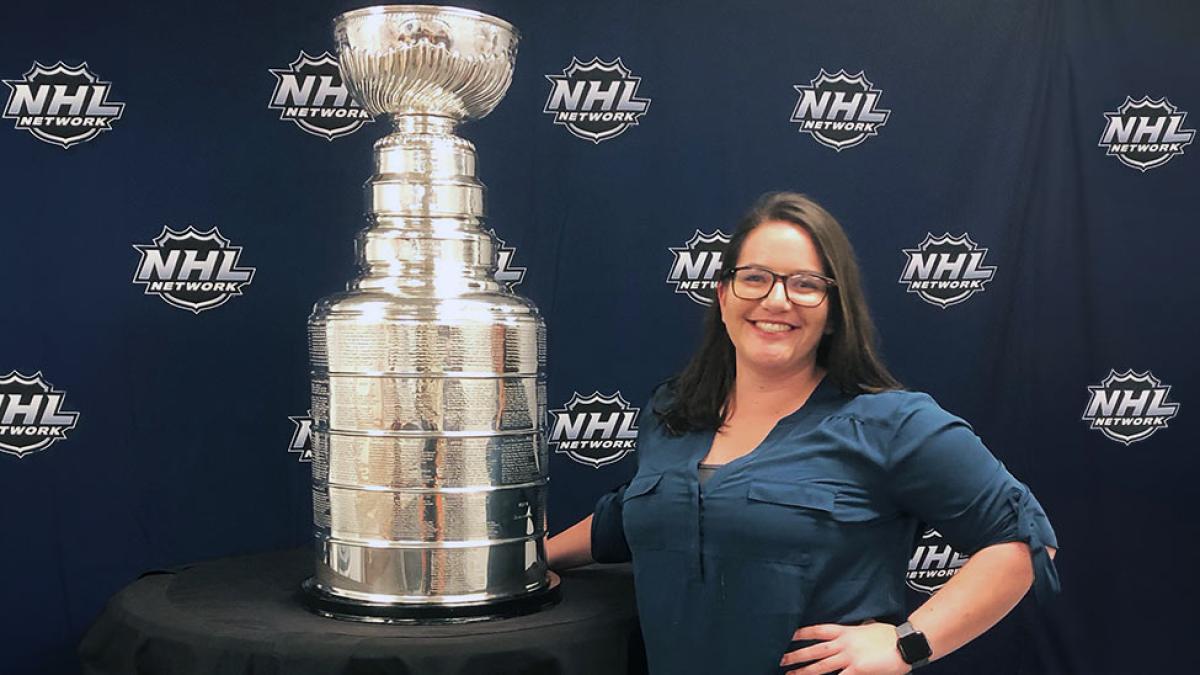

Kelly Whritenour
Class of 2018
Digital Cinema and Filmmaking, BS
As a media management technical specialist at the Major League Baseball (MLB)/National Hockey League (NHL) Network, Kelly Whritenour was part of a 2019 Emmy-winning broadcast team.
Please tell us more about your role and the experience of winning an Emmy.
My colleagues and I are responsible for ingesting, archiving, restoring, and delivering all content at the MLB Network/NHL Network for live-air and digital use. In my role as a specialist, I also lead new hire training, collaborate with major streaming partners, and work at large events such as the World Series, MLB All-Star Game, and the London Series. Since we are essentially the gatekeepers to all of our media, a significant portion of consumer-facing content runs through my department. This brings me great pride, especially when all our hard work culminated in an Emmy Award for Best Studio Show. I feel very lucky to have been a part of an award-winning production so early in my career; it has truly set a high bar for what I hope to achieve in a career in sports broadcasting.
How did your enrollment as a student in the award-winning PaceDocs travel documentary course offered by the Media, Communications, and Visual Arts department prepare you for your career?
I had the privilege of taking "The Doc" course, also known as Producing the Documentary, and taught by Professor Maria Luskay, twice. The first time, I served as a media manager, cinematographer, and co-lead editor for Ridge to Ranch to River to Reef: Florida's Conservation Connections (2017), through which I first discovered my passion for my work. It was a trial run for the roles that followed as a media manager, lead editor, and post-production manager on Puerto Rico: Hope in the Dark (2018). I was expected to take on a leadership position, which was daunting, given the weight of our topic: to tell the story of one of the largest natural disasters in our lifetimes. Traveling to Puerto Rico to capture footage of the damage and interview people who had lost everything is something I’ll never forget.
The Puerto Rico production allowed me to hone my technical expertise and taught me invaluable workplace skills such as meeting deadlines and managing other creatives. But the more important lessons learned were those of character and professionalism. We covered some emotionally heavy subjects, and balancing how to honor those who were part of our film, while ensuring that we reported all necessary facts, is not something that could be learned in a classroom. In addition to media ethics, I discerned how to navigate artistic differences and work with various personalities, which allowed me to grow into a more confident leader and filmmaker. Having the ability to build on those skills before even entering the "real world" was a significant steppingstone for my career.
Why did you choose to major in the Bachelor of Science in Digital Cinema and Filmmaking?
Growing up, I have always been passionate about movies, and would often delve into behind-the-scenes interviews with cast members and crew, fascinated by how my favorite shows were made. In college, and as my freshman year was nearing an end, my collegiate softball career was cut short by an injury, so I tried out some of the production courses that had caught my eye when I first looked at Pace. I started with Media Production 1 and The Making of the Motion Picture, followed by a screenwriting class during my study abroad program at Bangor University in Wales.
I was fascinated by these courses, but also by my professors who were as captivating as the subjects they taught, and I was enthralled by the endless possibilities of working in the field. With a professional-level studio available to students, all the camera gear we could need, and classes that push us to try new things and visit new places, it was an easy decision to declare my major. Suddenly, I was surrounded by a creative bubble of ideas and happenings, and I knew that this was where I wanted to be.
What other activities and organizations were you involved in as a student?
During my four years at Pace, I worked for Pace Athletics as a sports information assistant, and I was responsible for a number of game-day roles, including recording official stats, scoreboard operation, or camera operation for our live streams, and I had an absolute blast doing that. I believe this experience with Pace Athletics played a significant role in securing my current job at the MLB Network. Additionally, I was a member of Gamma Sigma Sigma National Service Sorority and Lambda Pi Eta Communications Honor Society. Further, I was an active member of the Residence Hall Association, serving as a hall president and council member for several years.
What internships did you have as a student?
During my time at Pace, I had the opportunity to work at a number of internships. In my junior year, I secured my first internship with the Metropolitan Transit Authority in their internal media group as a production intern. I later interned with Departure Films in casting and development, and after that, with Rob Dicena, a Dyson adjunct professor and casting director who kindly opened up some assistant casting positions at his organization to all students in the Media, Communications, and Visual Arts department.
How have Pace or Dyson faculty been instrumental in your journey?
I have received tremendous support from my professors and advisors, who have always been kind and genuinely concerned about their students' welfare. My American Sign Language (ASL) professors, Joshua Loeffel and Emmanuel Azodeh, had a profound influence on my growth. When they discovered that I am deaf, yet not proficient in ASL, they always took extra time to communicate with me, and being in their ASL courses helped me fulfill a childhood need for a community I didn't realize I longed for.
With a professional-level studio available to students, all the camera gear we could need, and classes that push us to try new things and visit new places, it was an easy decision to declare my major in digital cinema and filmmaking.
One of the things I love about Pace is the close-knit environment that exists within both the dorms and in academics. Students have the opportunity to get to know professors even if they are not taking their classes. I would often hang out and chat with Professors Paul Ziek and Michelle Pulaski-Behling about current events, my projects, and the latest happenings around campus. And I still remember the many tips and tricks of the trade from Professors Melanie La Rosa and Lou Guarneri, which I often pass on to my coworkers. Professor Luskay consistently challenged me to produce my best work and helped me build my confidence as a leader and filmmaker, always willing to lend an ear whenever I needed advice.
College is a significant time in a person’s life. In what ways has your time as a Dyson student influenced you to become the person you are today?
My years as a Dyson student were among the most rewarding and introspective moments of my life, and my knowledge of the world has grown tenfold thanks to my experiences both in and out of the classroom. A well-rounded education allowed me to apply knowledge from my core and elective courses to those in media and communications, and so I graduated with a good sense of what it means to be a storyteller and an informant in a media-driven society.
In addition, I lived and learned alongside some of the most interesting people I had ever met, all from different places and socio-economic backgrounds, and today, I have friends who love and support me whether they’re 10 minutes or 3,000 miles away. Thanks to my experiences, I am now a more informed, compassionate, and confident person than I was when I first set foot on campus many years ago.
What advice would you give to our students, as they navigate their college life?
My advice to students is to be open. Because you’re trying to figure things out, there will be missteps and mistakes, and that can be terrifying. But, if you remain open to the possibilities in front of you, one of them may turn out to be the best decision you’ll ever make.
November 2023: A Message from President Krislov
This month, Pace is diving deep with Social Justice Week, celebrating our first-generation students and veterans, and developing innovative ways to improve the world around us.
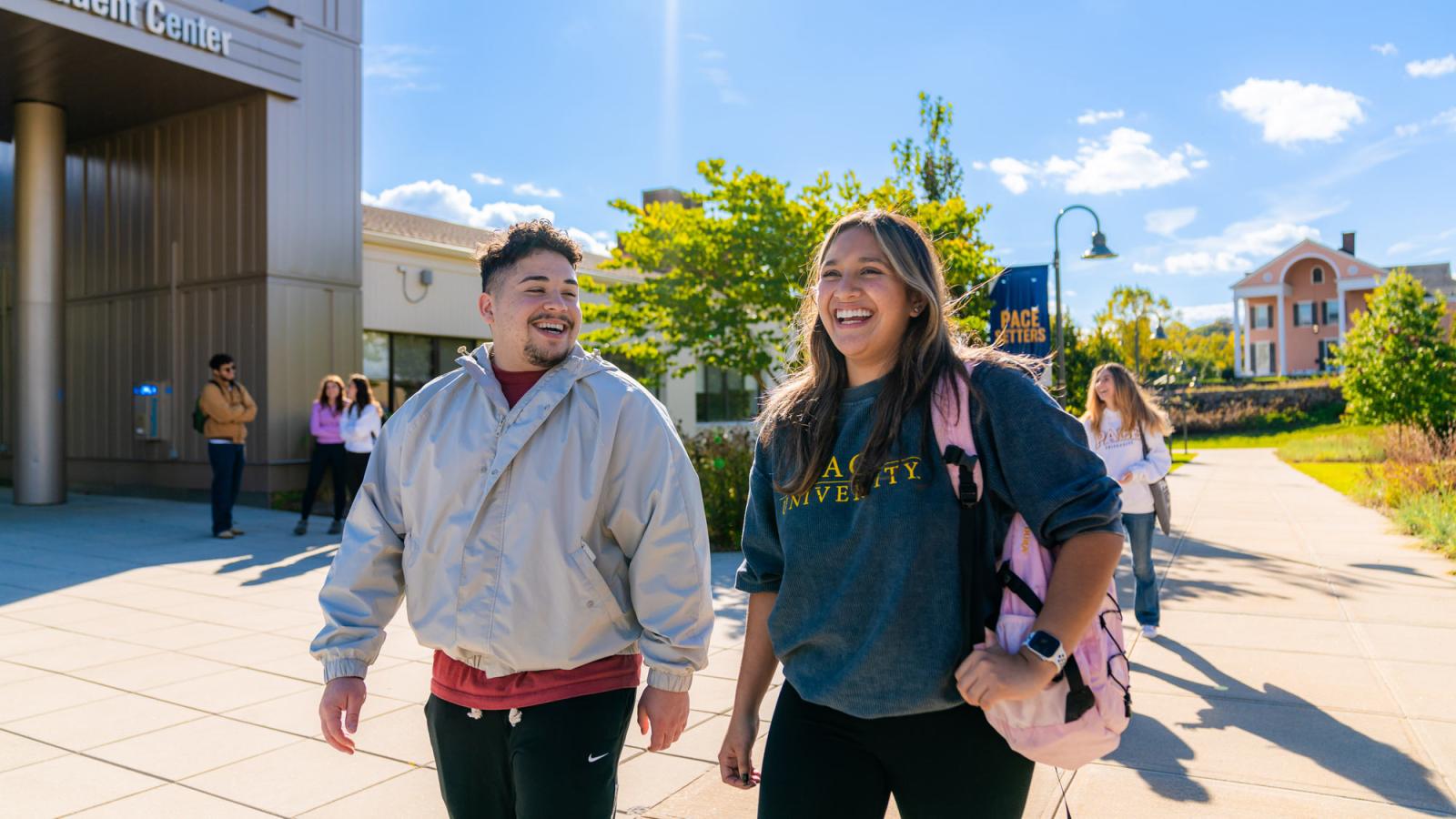
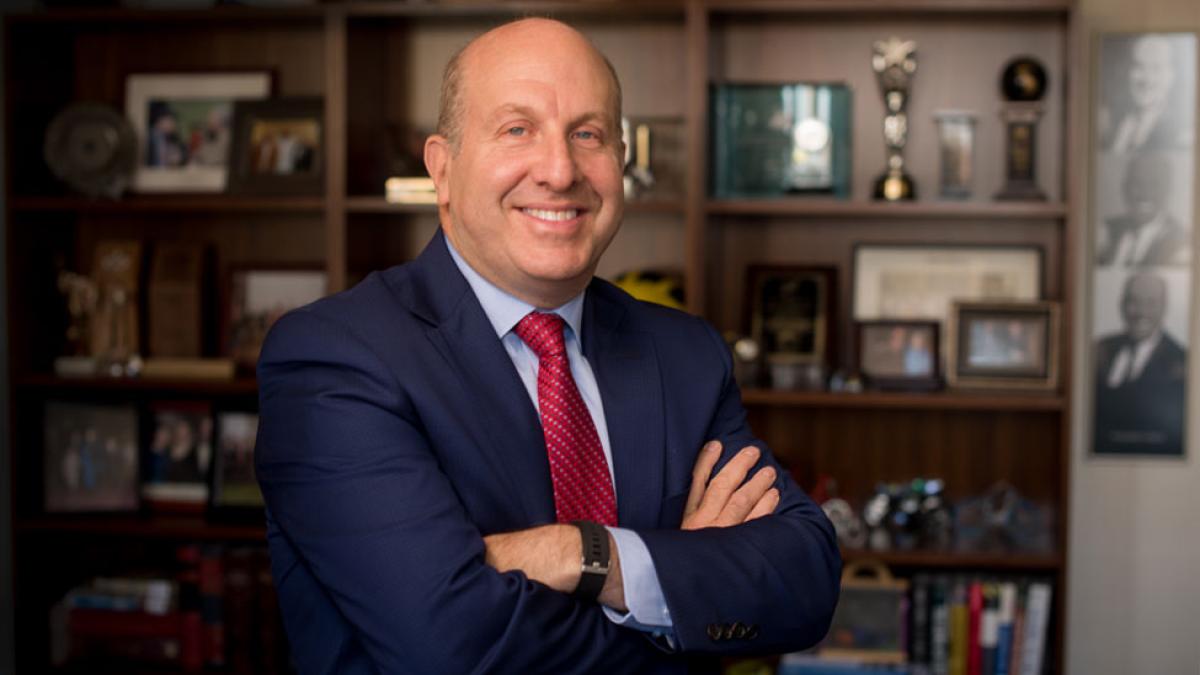
This week is Social Justice Week at Pace University.
Thirteen years ago, DJ Henry, a Pleasantville student and member of the Pace Setters football team, was shot and killed by a Pleasantville police officer on Homecoming Weekend. Each year, we present Social Justice Week each year to honor his legacy, keep alive his memory, and create opportunities for new generations of Pace students, staff, and faculty, to engage in dialogue about issues of racial and social justice and make positive change in our communities.
As you’ll read in this edition of Pace Now, Social Justice Week this year includes more than 40 events recognizing that DJ’s story cannot be told accurately without acknowledging its connection to a history and reality of racism, inequity, and injustice. Highlights of this year’s Social Justice Week including campus vigils in DJ’s memory—the New York City vigil is this evening—and a discussion tomorrow at the Elisabeth Haub School of Law led by Westchester County District Attorney Miriam E. Rocah, who recently ordered an independent review of Henry’s shooting.
You can find more information about Social Justice Week here, and more information about the Haub Law event here. To learn more about DJ and his life and legacy, you can view this video from the DJ Henry Dream Fund, established by his family.
Elsewhere in Pace Now, you’ll see other examples of how the Pace Community interacts with the broader community and works to improve the world around us. In one feature story, we look at National First Gen Student Day, and we shine a spotlight on Valentina Rojas Abreu ’24, who is working to build a first-gen community as president of the First Generation Program. Elsewhere, we check in with a thriving group of Pace student veterans whose sense of togetherness helps them bridge the transition from service to schooling. And you can also learn about a major new grant challenge launched by the Pace Entrepreneurship Studio and their partners at Speedemissions that could result in a $15,000 prize for a startup with an innovative idea to help address climate change.
I know all of you at Pace are working to make a difference and make the world a better place. Let’s all keep up that important work.
More from Pace
As an intern for Internal Communications and Engagement at Warner Bros. Discovery (WBD), Bianca Mazur '27 spent her summer learning the ins and outs of the entertainment media industry.
Jesse Carlo, PhD, assistant professor and chair at Pace University's Sands College of Performing Arts, is lighting up the stage and inspiring our students to reach for the stars. From Broadway to the classroom, we're taking audacious steps in the world of musical theater with our unique Life Experience Route.
The transition into higher education is always bumpy but can be especially challenging for veterans and those leaving active service. A sense of community not only bridges the civilian-veteran gap, but can also improve veteran’s mental health and sense of purpose after service. Three veterans from the Pace Community weigh in on the importance of inclusivity, community, and what it means to be a student veteran.
Interning at Warner Bros. Discovery: Bianca Mazur '27
As an intern for Internal Communications and Engagement at Warner Bros. Discovery (WBD), Bianca Mazur '27 spent her summer learning the ins and outs of the entertainment media industry.
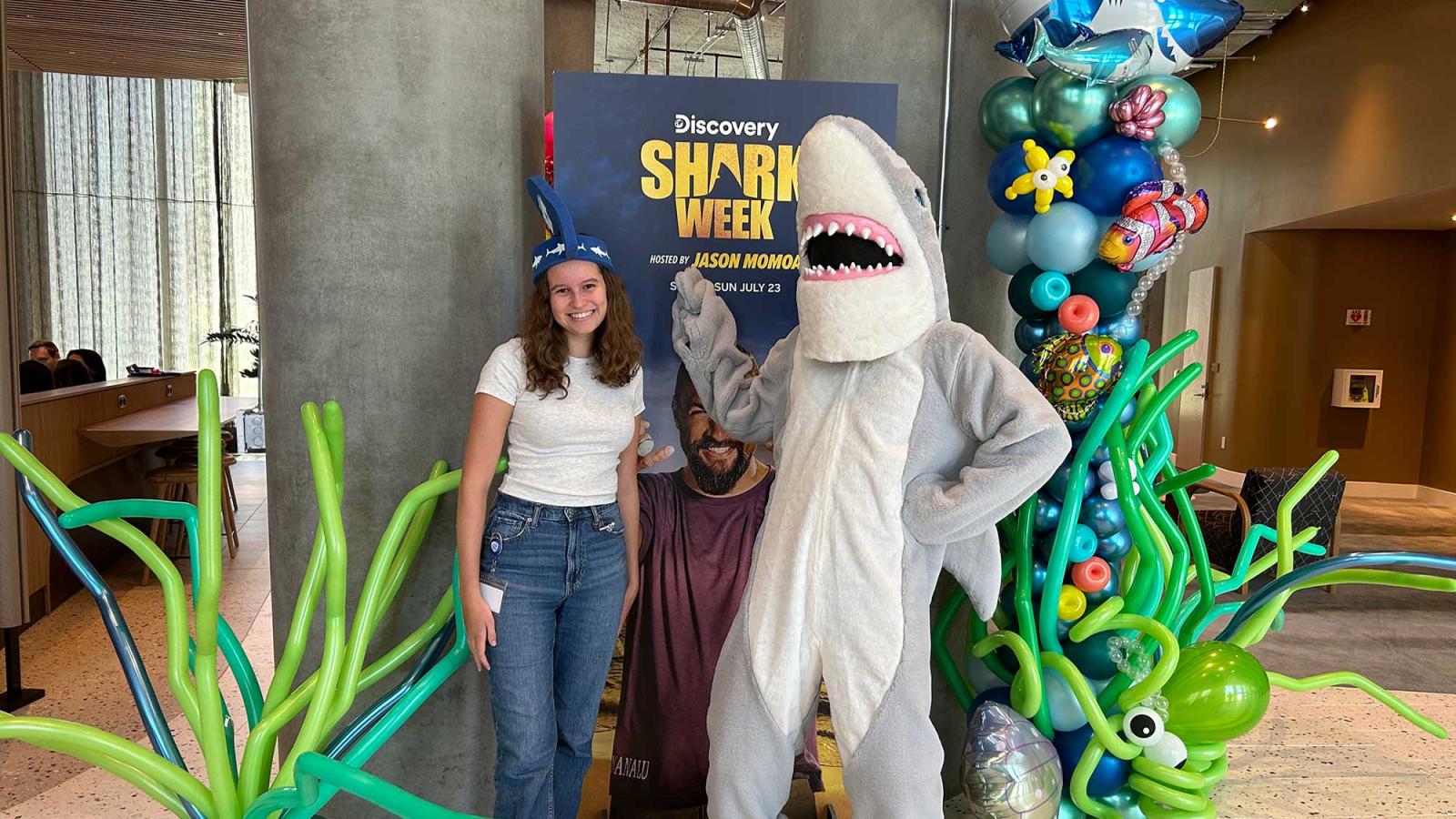
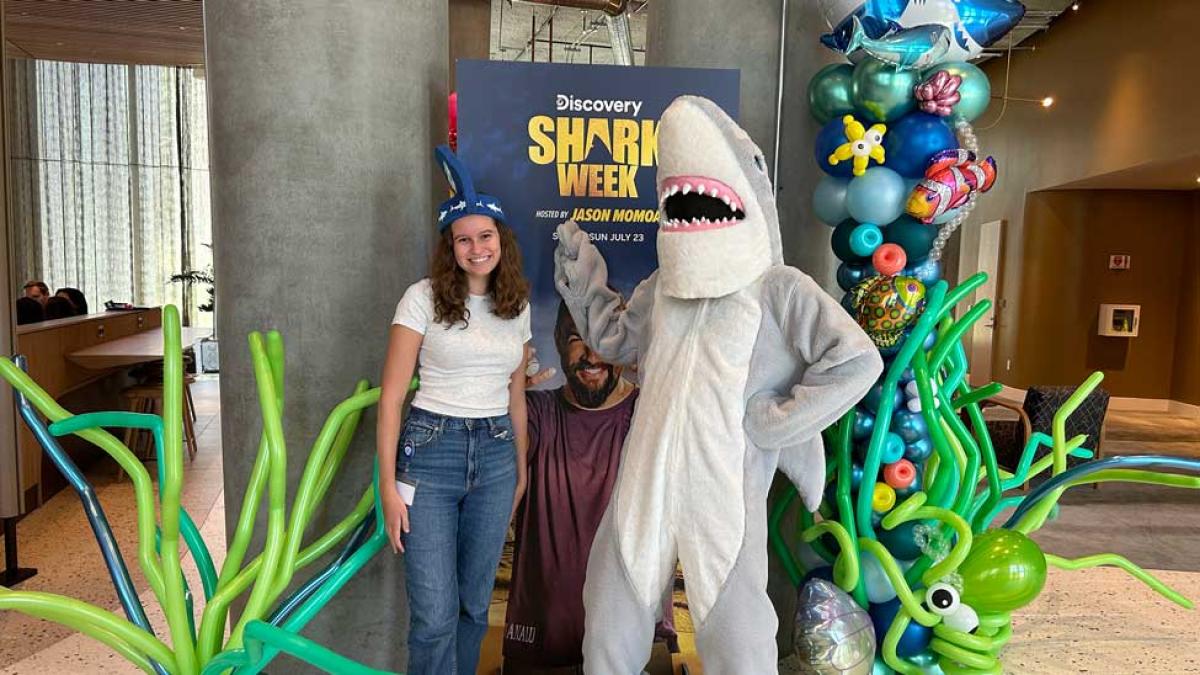
Name: Bianca Mazur
Pronouns: she/her
Anticipated Year of Graduation: 2027
Hometown: Burbank, California
Degree/Major: Marketing, Advertising and Integrated Marketing Communications, BBA
Internship role and employer: Intern for Internal Communications and Engagement, Warner Bros. Discovery (WBD)
Tell us a bit about what you did during your internship. Walk us through what an average day looks like for you.
In my internship, I was responsible for writing copy for posts, helping out at events, and coming up with content ideas for WBD’s internal social media website. On the average day, I get to work at 9:00 a.m., and spend about half an hour responding to emails and catching up on any company news.
I usually have meetings in the morning, so I log into Zoom and discuss upcoming events and posts with the team, which is divided between Los Angeles, New York City, and Atlanta. After that, I look through the company’s organization charts and LinkedIn to research people I would be interested in speaking to, to learn about their roles.
Around noon, I head to the Lot to meet some of my intern friends for lunch, and we walk around the Lot if we have time, making sure to visit the Stars Hollow set and grab a water at Starbucks. Then, I either stay on the Lot to help the team if there’s an event going on, or I drive back to the office if there’s nothing planned.
For events, I assist in setting up, make sure everyone has proper verification to enter the theater, and greet guests with a smile. If there’s no event for the day, I meet up with my managers to brainstorm content ideas for social media and the company newsletter. I research information about the topics, write copy for social media posts, and come up with ways for employees to enter the latest giveaway. I have at least one networking meeting per day, because I want to ensure that I’m taking advantage of being here as an intern. After that meeting, I continue working with my managers on my writing tasks for the day, and then send my work over to them when I’m done. I say bye to my managers and the rest of the team on my floor, and leave at 6:00 p.m.
What made you gravitate to this role? Was it the organization, the responsibilities, something else?
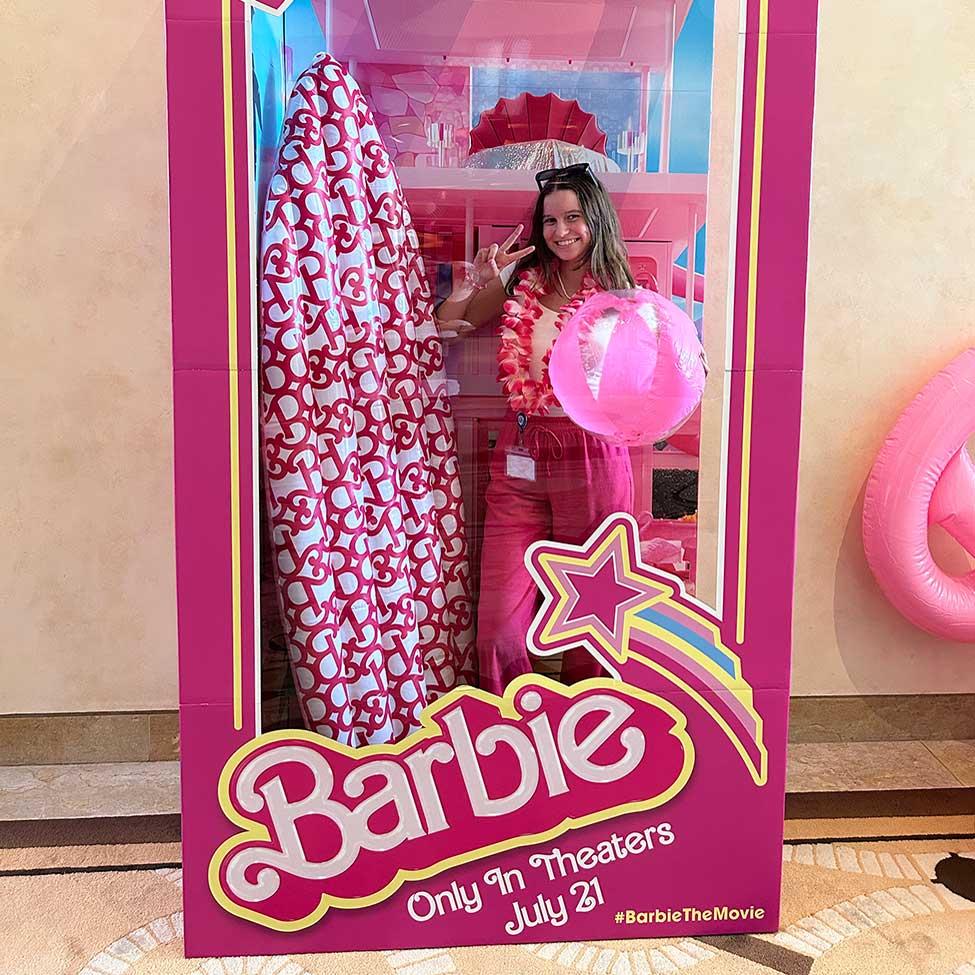
I was interested in this internship because of the opportunities I could gain from it. I’m in a four-year internship program called the Reach Honorship Program, and I’m on the business track specifically. In this program, I will return to WBD for the next three summers for my internship, and each year, I will switch departments to gain an understanding of what different areas on the business side of the company do. I get assigned to a department each year, and this year working on the Internal Communications and Engagement team, I got an insight to how the company works.
I also wanted to join this internship program to meet people in the field and expand my network, because I would definitely be interested in working at Warner Bros. Discovery after graduating. Moreover, I really love the content that WBD puts out (especially Friends), so I figured it would be a perfect fit!
Did you work on any projects or complete any special tasks that brought you a sense of self-satisfaction?
In my first week, my team was working on a piece about the new products in The Flash line, which was a great experience. My manager and I interviewed two people who worked on the products, converted the audio recordings of the interviews into text, and then I edited the text alone.
It was about 20 pages, and I went through each sentence to ensure that it was grammatically correct and flowed smoothly with the rest of the paragraph. All of this work was done in one day, and I felt satisfied that I had accomplished so much. Towards the end of my internship, I worked on another project, and this one was in partnership with the other intern on my team. For this project, we interviewed other interns to learn more about their roles at the company. I asked the interview questions and helped with the lighting set up, and the video was posted on WBD’s internal social media website and on @wbdlife’s Instagram account. It made me really happy to see that a video I worked on reached so many people.
Do you have a better sense of the industry now that you’ve had the opportunity to participate in it? Has your internship opened your eyes to new paths or options within your intended field?
I definitely have a better sense of the industry since I’ve had the opportunity to be a part of it. This internship helped me realize that I’d be interested in trying something with social media management and content creation, and also that I’d love to have another internship where I have creative freedom to design something.
Have you interned anywhere else prior to this?
This is my first internship! Before this, I was a host at a restaurant for almost two years.
Did you get this internship with assistance from Career Services or did you snag this one independently?
I heard about this internship from two of the girls who joined the program the year before, and they said they really liked it, so I applied!
What have you gained from this internship role?
From this internship role, I expanded my network and made a lot of new connections. Between working with other teams for events and seeing people on the Lot, I was meeting someone new every day, and it was super interesting to learn about their positions. This helped me improve my communications skills as well. I also gained a better understanding of aspects of the company and how long it takes for an idea to turn into a movie or product.
Do you have any advice for people who are considering taking on their first internship?
Go for it! Internships are great learning opportunities. Even if it’s not your perfect fit, you gain soft skills that you can apply to other jobs and internships, and an internship can help you realize what you want (or really don’t want) to do in the future. You’ll meet so many new people and form connections with them, which could lead to career opportunities in the future.
If your internship was a TV show or movie, what would it be and why?
If my internship was a TV show, it would definitely be Friends. Everyone is really close, and there’s always something fun going on. When I check in every morning, I’m always in a good mood because I get to work with some really great people.
Did you have a favorite spot to get lunch nearby?
My favorite spot to get lunch nearby is Raising Cane’s because it’s only a short drive away from my building, and I always see someone I know when I eat lunch there!
Did anything unexpected or silly/funny happen during your internship? What was it and what did you take away from it?
When I started my internship, I never expected that I would be walking around the cafeteria at lunch with another intern who was dressed up as Chompie, the official Shark Week mascot. We were tasked with passing out Shark Week fin hats to employees eating lunch in the building, and hyping them up for Shark Week. It was pretty funny to walk around the lobby and talk to a guy dressed in a shark costume. Everyone was super excited to see Chompie and grab some free Shark Week merch.
From this experience, I learned that a job is only as fun as you make it, and that everyone loves free swag :)
More from Pace
Lubin student Samantha Nieves '24 is going above and beyond at her summer internship with Cisco. Not only does she welcome feedback from her managers, but she's also not afraid to ask questions, learn new things, and take on challenges...And she isn't just a leader at Cisco. This fall, Samantha will serve as Chief Executive Officer of Pace University's on-campus chapter of the American Marketing Association. Equipped with her experience from Cisco, Samantha is ready to take AMA to the next level.
MPA graduate Ásthildur Sturludottir has been serving as the mayor of Akureyri, Iceland since 2018, where she champions sustainability and renewable energy. Committed to creating a brighter future, she believes that communities, both large and small, should embrace sustainability and leave a positive impact on the environment.
Lubin student Sadie Lorence spent her senior year researching the intricacies of a notable legal dispute around the ’90s hit song, “Bittersweet Symphony”–and in doing so, has found her professional calling.
Pace People: Jesse Carlo, PhD
Jesse Carlo, PhD, assistant professor and chair at Pace University's Sands College of Performing Arts, is lighting up the stage and inspiring our students to reach for the stars. From Broadway to the classroom, we're taking audacious steps in the world of musical theater with our unique Life Experience Route.
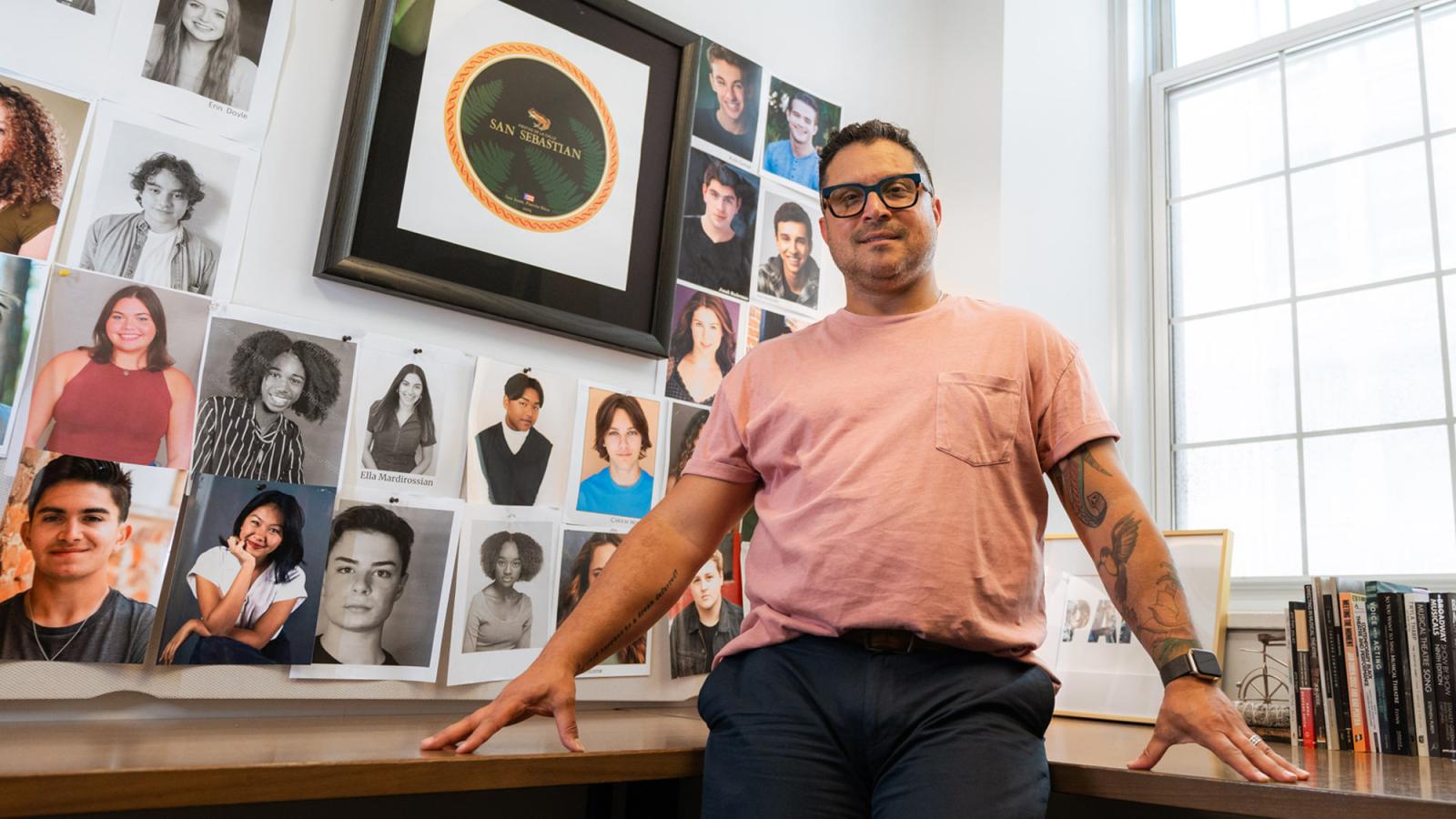
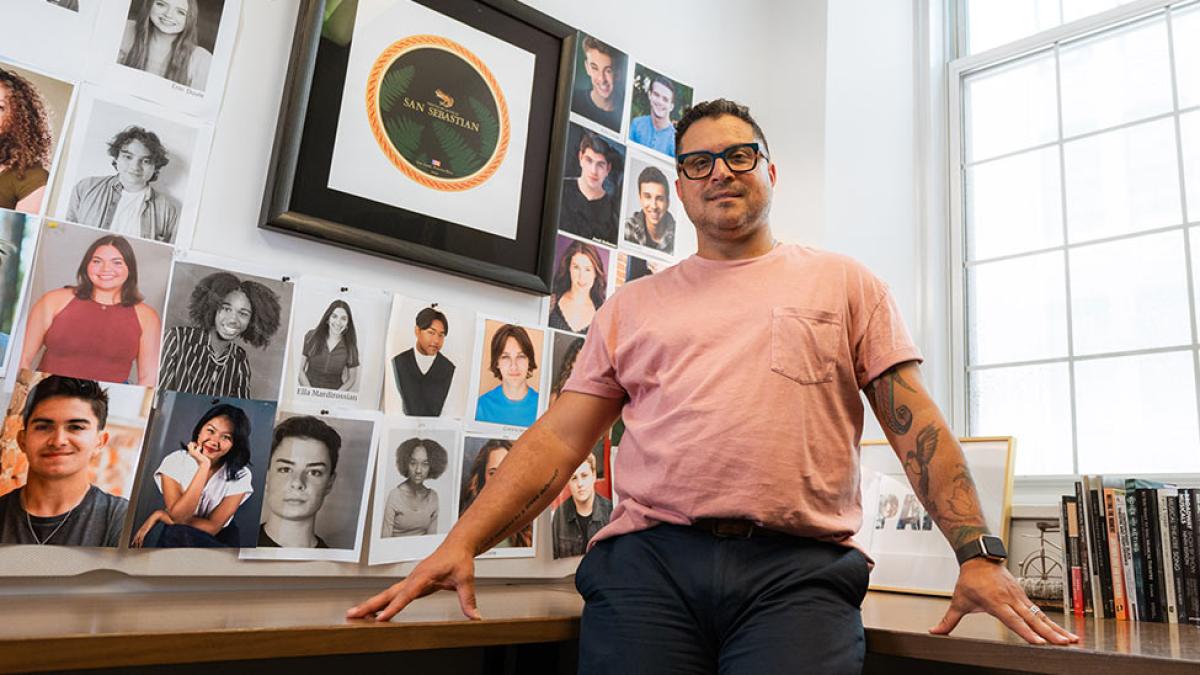
Assistant Professor of Musical Theater and Commercial Dance Chair at Pace University’s Sands College of Performing Arts Jesse Carlo, PhD, is an inspiring force behind the institution's vibrant creative atmosphere. In his illuminating video profile, he emphasizes the invaluable exposure Pace University provides to its students, allowing them to collaborate with industry luminaries, including Tony Award, Grammy Award, and Oscar winners. A unique opportunity that not only nurtures students’ talent but also fuels their passion, motivating them to take audacious steps in the competitive world of musical theater. What sets Pace’s Musical Theater program apart is its innovative Life Experience Route, a pathway that enables students to pursue their degree while taking breaks to perform on Broadway or national tours. Professor Carlo takes pride in supporting his students through this transformative journey. When these performers return to the classroom, they bring back a wealth of real-world experiences, enriching the educational environment.
More from Pace
April Bartlett’s career as a theatrical designer has spanned from intimate off-Broadway productions to The Today Show. When the pandemic shut down production, she began refocusing her energies and found a new way to continue telling stories by supporting the next generation of designers, makers, and artists.
Imagine dancing with Doja Cat. Now imagine doing it in front of 865,000 people. For Joanne Daquigan, Jada Clark, and Tiffani Rusell that dream became reality. Last month, they and several other members of the Pace Commercial Dance community performed alongside some heavy-hitting A-listers at MTV's VMAs.
Ka’ramuu Kush, a faculty member of the Sands College of Performing Arts, is sharing wisdom and experience gained from many years as a working actor, director, and writer with students—and has already made quite an impact.
Building a First-Gen Community to Last
From mentee, to mentor, to president of the First Generation Student program, Valentina Rojas Abreu ’24 knows the importance of community. Looking forward to National First Generation Student Day on November 8, Valentina reflects on the evolution of the first-gen program and what makes the first-gen community at Pace so special.
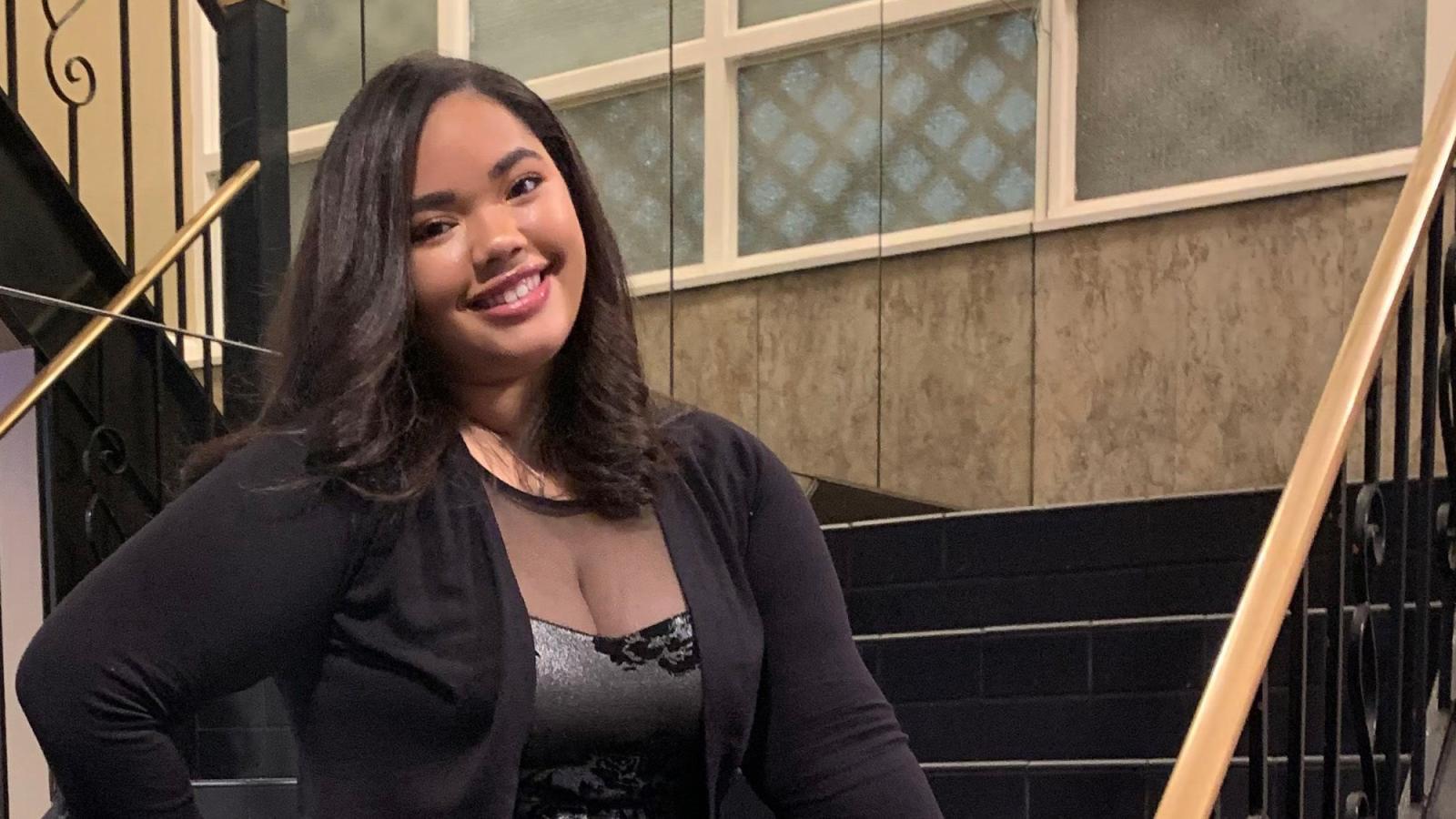
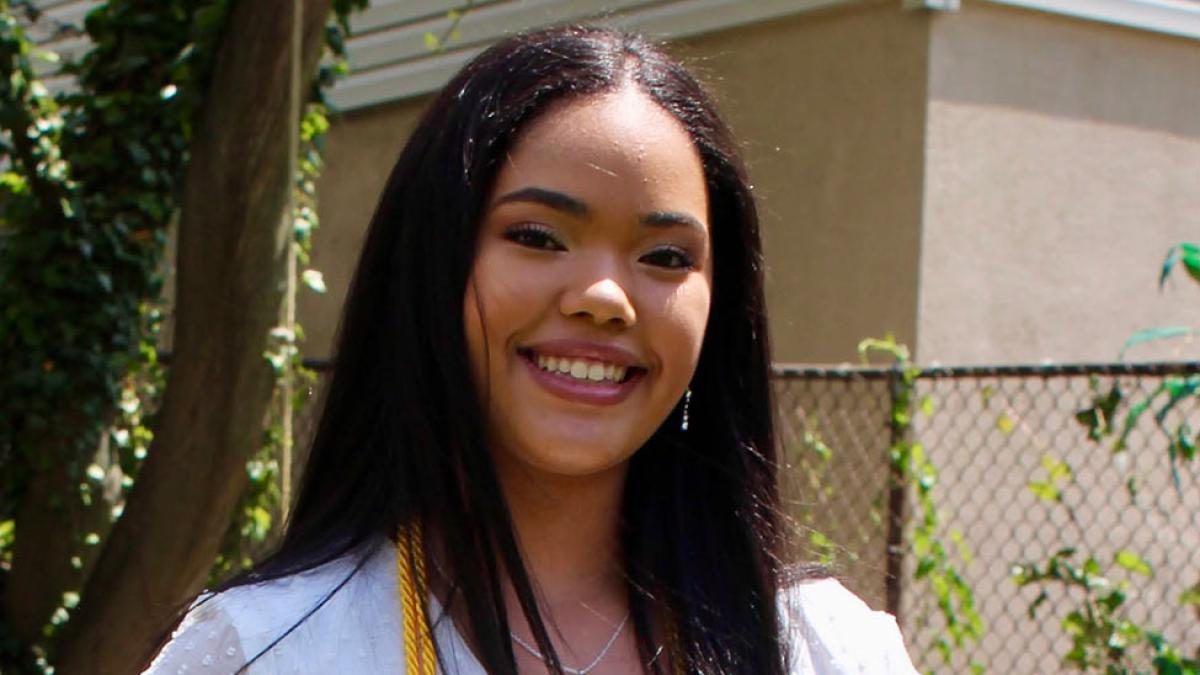
“I love being a commuter student. I try to be heavily active on campus. Sometimes I'm literally here for 12 hours a day because I work on campus and attend my classes. But I love it.”
Valentina Rojas Abreu ’24 knows the importance of taking her education into her own hands.
A health science major on the pre-physician track, Valentina is plugged in to life on the Westchester Campus as a student assistant in the Dean for Student’s Office and Student Affairs, and in her role as president of the First Generation Program.
A lot of us [first-gen students] are so independent because we don't have that safety net.
Valentina is so driven, in part, because she’s always had to be. She recalled that as she grew up, she and her mother were learning English at the same time. Her mother helped where she could but even the way she had learned math in the Dominican Republic was different from the classwork Valentina brought home in the States. “I ended up being very independent,” she explained. “And I'm the firstborn in my family. So I don't have an older sibling to ask ‘how did you do this’ or ‘what is FASFA?’”
Valentina’s experience is that of first generation students everywhere. “A lot of us are so independent because we don't have that safety net,” Valentina says. “Not that we don't have people to depend on, but at least on an academic standpoint, you are on your own.”
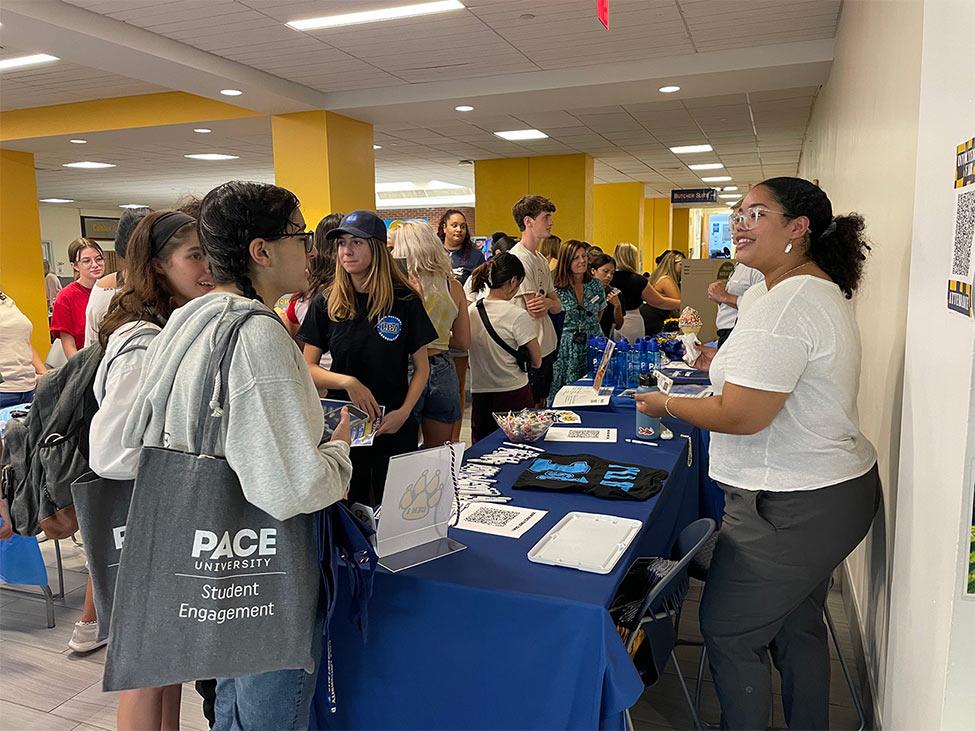
She found support during her last years of high school through the Yonkers Partners in Education, a mentoring program that provided students with graduation coaches. As she began to look into colleges, she was drawn to Pace because of its connections. “It’s five minutes away from the number one trauma center in the Northeast,” she says, an important factor for a health science major. “I’d heard great things all through high school about how many connections Pace has to different companies and programs. I liked that I could commute and that there was a New York City Campus I could take advantage of if I wanted to.”
She came to Pace and was thrilled to discover that there was a mentoring program for first-gen students. Knowing how much it impacted her to have that peer support in high school, she signed up. “We were paired with upper level students, usually someone in your major, to mentor you and help you out,” Valentina says. “And when you’re a sophomore, you're given the opportunity to then be a mentor to other students.” She continued on with the program and received three students to mentor. To this day, even as the program has evolved and she’s stepped up into the role of president of the program, she’s still close with her mentees. “I try to encourage them in the same way I was encouraged.”
I’d heard great things all through high school about how many connections Pace has to different companies and programs.
The First Generation program is open to any first generation students attending Pace. “Some people don’t even realize they’re a first generation student,” according to Valentina. A first generation student is determined as someone whose parent or parents did not receive a four-year degree. “Even if your parents received an associate degree rather than a four-year degree, or your siblings have gone to college, you're still considered a first-generation student.”
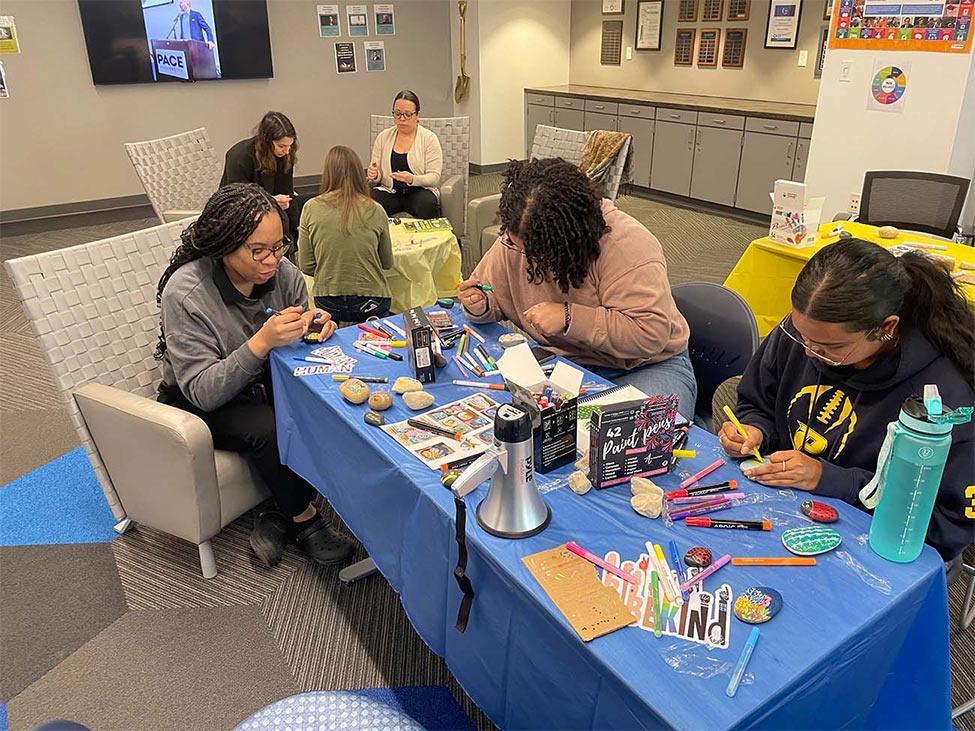
The program has now expanded to encourage more than just one-on-one mentorship, but to instead foster a community among the first generation students at Pace, and as president Valentina works to ensure every student has the support they need. She helps oversee and organize events for the program, from vision-journaling socials, to financial aid workshops, and now with programming for the first-ever First Generation Honors Program.
Valentina explains, “We joined the National Honor Society called Tri Alpha, which is for first generation students.” Students who are academically eligible can join to take advantage of Tri Alpha benefits, such as leadership opportunities, lifetime membership, graduation cords, and more. Their first induction is taking place on November 8, National First Generation Students Day, marking an exciting new milestone for not only the students, but the program itself.
I try to encourage them in the same way I was encouraged.
Reflecting on her time at Pace and in the First Generation Program, Valentina can’t help but realize how much being a part of the first-gen community impacted her path. She has her on-campus job because a former leader in the program used to send out job blasts and made her aware of the position. Now, Valentina is the one sending job blasts and opportunities to other students, carrying on that ethos of passing along the support she was once offered.
Valentina has graduated from mentee, to mentor, to president of the program, and is helping usher in a new era with the addition of the Honors Society. “It’s a full circle moment,” she says. “And that’s what the program is dedicated to.”
To learn more about Resources for First Generation Students and the First Generation Program send an email to plvfirstgen@pace.edu. For more information on the Honors Society, visit Tri Alpha’s website.
More from Pace
A first-generation American, and the first in her family to go to college and law school, Maria Profeta '22 always had the goal to use her education to better her family and her community.
Computer science student Sachin Archer knows what it’s like to defy expectations. His journey has led him from Jamaica to New York City, and now the world. Take it from him, it’s never too early to dive in: “I'm doing all these amazing things. And I'm only 19.”
Seidenberg's new faculty member, Jonathan Williams, brings his expertise to the human centered design master's program, where user experience leads technologists, artists, designers, and psychologists to build better, more equitable, and more beautiful things.
Supreme Court To Hear Dispute Over Public Officials Blocking People On Social Media
Leslie Y. Garfield Tenzer, a law professor at Pace University, said there is a “gray area” between public officials being able to block people and stop harassment and the rights of others to view online posts. She said the legal protection social media companies enjoy under Section 230 of the Communications Decency Act, which allows the companies to be immune from certain lawsuits over content posted by third parties, should be amended to prevent any online harassment. “If public officials want to stop allowing harassing information, I think they must address it by amending Section 230 of the Communications Decency Act, which is a difficult, if not impossible task,” Ms. Tenzer said. “I also think as a mother, and a social media scholar, that publishing anti-hate rhetoric or posts that teach others to kill should never be permitted. But as long as section 230 exists, I think it is hard to hold social media companies accountable.”
'Harry Potter' Is Having A Moment Again. Here's Why.
Dyson Professor Melvin Williams speaks with USA Today about why the viral 'Harry Potter' meme is taking over TikTok feeds.
"Our engagement in the 'Harry Potter' TikTok trends exhibits how audiences are no longer passively waiting for media conglomerates to supply content for their consumption needs, but instead are actively creating what they desire to see using familiar pop culture figures, symbolism and the autonomy that has always been at the hands of media consumers," says Melvin Williams, associate professor of communication and media studies at Pace University.
Viewing Israel-Hamas War Through The Lens Of History, Education By NY Experts
Dyson Professor Jared Manasek and several NY education experts provide historical insights and context to LoHud/Gannett for a story about viewing the Israel-Hamas conflict through a historical and education lens.
Expert: Trump's lawyers making "nonsensical arguments" in effort to evade Jan. 6 charges
Such arguments are “nonsensical,” Bennett Gershman, a former New York prosecutor and law professor at Pace University, told Salon. “Every person, including Trump, has the right to engage in ‘forceful political advocacy,’” he said. “But Trump and his co-conspirators went far beyond advocacy. Trump and his cohorts engaged in a criminal conspiracy to subvert the results of a lawful election by illegal means. To endorse this argument would be to sanction any action taken under the guise of political advocacy, including violence and even political assassination.”


